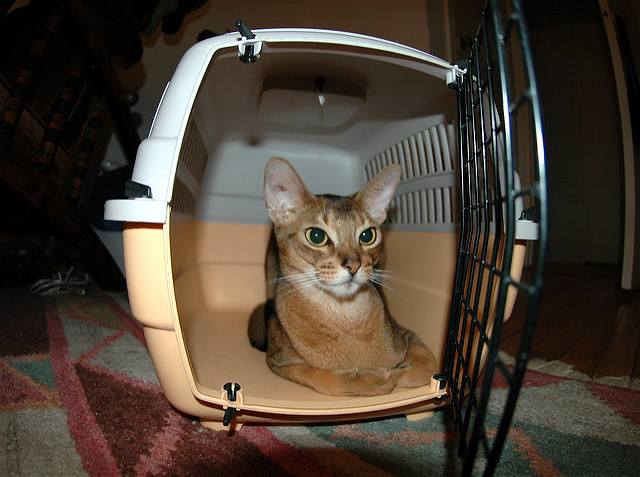Moving is stressful even on people, and it may be much more so for our pets who don’t understand what’s happening. Cats are especially resistant to change. You want things to go as smoothly as possible, so here are 6 tips for reducing your cat’s stress during a move.
#1 – Get them used to a carrier before the move

If your cat has only experienced a carrier on the way to the vet, you’ll want to teach them that it’s a safe place to be and hide before the big move. Leave it out and open with a favorite toy or blanket inside as far in advance of the move as possible, and praise them when they go inside to investigate. Move on to feeding them inside the crate and then playing with them after you’ve closed them in for a bit. The goal is to help them understand that the carrier is a safe place to be.
You can help your cat get used to his carrier using Project Play™ Comfort Cuddler™

#2 – Bring in moving boxes early…

…so your cat can get used to them before they suddenly fill the whole house. On moving day, keep your cat in the carrier in a room with the door shut – the last thing you want is for them to dash through the door in a moment of panic! When you place the carrier in the car, make sure it gets plenty of ventilation. If your new home is far away, cover the crate with a sheet since a view of the world moving can be upsetting.
#3 – Pack a separate bag for your cat
You don’t want to have to dig through one box for your cat’s food, another for their bowl, and a third for their toys once you reach your new home. Be sure to label the carrier and have tags on your cat’s collar with your name and phone number. If you’re traveling out of state, keep your cat’s vaccination and health certificates handy, since many states require them.
#4 – Find a pet-friendly hotel
If your move is long enough to require an overnight stop, you’ll want to call ahead to find a hotel that’s actually pet-friendly. Don’t just settle for a hotel chain that claims to be pet-friendly on their website – each location may have different rules and they may have a limited number of rooms available for people with pets. In the hotel room, look for hidden dangers before letting your cat out of the carrier.
#5 – When you arrive at your new home…
Confine them to one room until everything has been moved in, the movers have left, and you’ve had a chance to thoroughly check for hidden hazards. This will also help them adjust to the new location. Let them explore the new house slowly, leaving some doors shut until they’ve had a chance to adjust.
#6 – Put your cat’s things in familiar locations
If your cat’s litter box was in the bathroom of your old home, don’t put it in the laundry room of your new home. Don’t change any routines or feeding schedules until your cat has had time to adjust to the move, and then make changes slowly.
(H/T: Petfinder, ASPCA)





